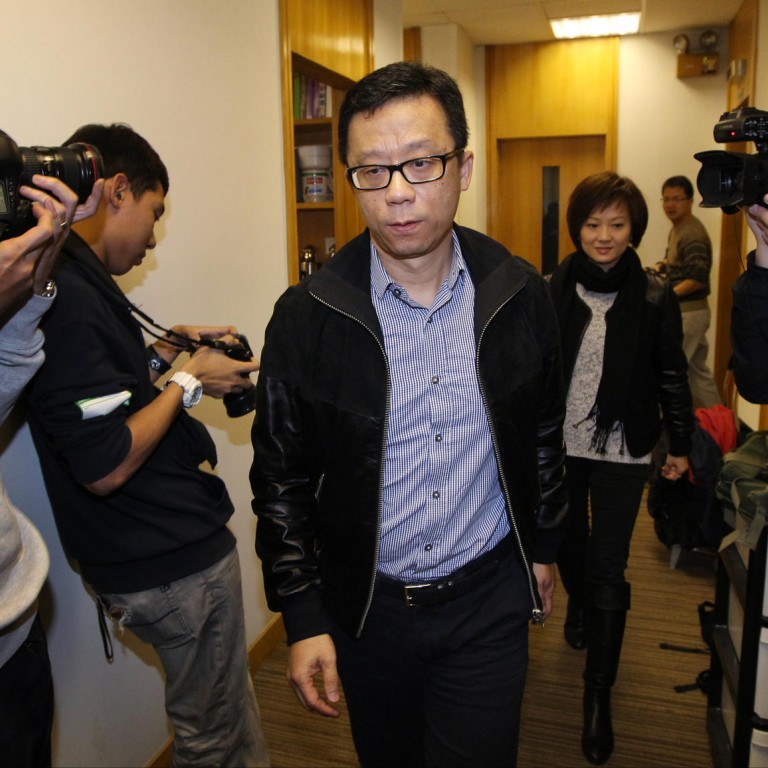
Ricky Wong's plans for mobile TV hangs on legal grey area
Experts say government's justification for rejecting HKTV service rests on uncertain legal distinction between traditional and new media
Laws that govern traditional and new media by different standards leave Ricky Wong Wai-kay's plan for a court challenge to the government's rejection of his mobile television service hanging in the balance, legal experts say.
The laws contain "grey areas" and are outdated, they say.
At issue is Wong's plan to use a higher-quality format known as DTMB for his Hong Kong Television Network service instead of the lower-definition CMMB used by China Mobile from whom Wong acquired the licence.
The Communications Authority said this would in effect allow Wong's mobile broadcast to be viewable by households using traditional television sets.
This is because TVB and ATV, the two free-to-air broadcasters, are also using DTMB.
A key question is whether mobile television is covered by the Broadcasting Ordinance or the Telecommunications Ordinance. The government's view is that a service falls under the former if it can reach more than 5,000 households.
The authority said Wong - who planned the service after being denied a new free-to-air licence - would need a licence for either a free or paid service.
Wong said on Tuesday he would seek a judicial review.
Information Technology Federation honorary president Francis Fong Po-kiu said yesterday it was unclear who would win because the issue - whether DTMB could be applied to mobile television without further restrictions - had no precedent.
Institution of Engineer member Henry Cheung Nin-sang, said it was wrong for the government to equate the mode with viewing quality as a number of factors could affect the final quality.
The authority also drew ire for apparently infringing the government's "technology-neutral" principle by referring to a particular technical mode.
"The authority's explanation has deviated from the technology-neutral principle," information-technology sector lawmaker Charles Mok said. "It failed to explain which aspect of the DTMB technology, or its usage, was in conflict with the policy concerning mobile TV."
Professor Anthony Fung Ying-him, director of journalism and communications at the Chinese University, said the authority's stance on the HKTV row "violates in all respects" the neutrality principle.
"Only mobile TV is being targeted now, but the restriction is not equally applied to internet and broadband television services," he said.
Wong said his understanding was that as long as the receiving tool - like a USB device or anything movable rather than fixed - was mobile, the service was classified as mobile television.
Strengths and weaknesses
Ricky Wong Wai-kay's proposal to use Digital Terrestrial Multimedia Broadcasting (DTMB) for HKTV's mobile television service was rejected by the Communications Authority. It proposed China Mobile Multimedia Broadcasting (CMMB) or Digital Video Broadcasting-Handheld (DVB-H).
Here is an explanation of the differences provided by the watchdog:
Terrestrial and mobile television
Up to high definition 1080i
Up to two million households can watch digital television by tuning in without having to buy new receivers. Alternatively, they can watch the programmes on their mobile phones connected to receivers
High video quality at fixed locations, low mobility - services prone to interruptions during commutate
Mobile television
Low definition of 320i
On mobile phones, some of which may have to be connected to receivers.
High mobility, low quality
Mobile televisions
Up to 1080i
On mobile phones or televisions, some of which may have to be connected to receivers
High video quality, but users must buy new receivers
Timeline
How the government has defined mobile television services under the law over the past few years:
February 2007 The then Broadcasting Authority (now Office of the Communications Authority) decides that mobile television services need not be licensed under the Broadcasting Ordinance when it rules that an appeal of a complaint against four 3G mobile-service operators for offering the services without licences was unjustified
December 2008 The Commerce and Economic Development Bureau suggests separating licensing regimes for regulating "conveyance" and "content" of mobile television services, and for the services to require a unified carrier licence issued under the Telecommunications Ordinance
February 2010 The government announces that licensing arrangements for broadcast-type mobile television services will come under the Telecommunications Ordinance. Service operators have to offer coverage for 50 per cent of the population within 18 months of the licence being granted. The government says it will adopt a market-led, technology-neutral approach, allowing the market to select technical standards for such services
February 2010 The then Office of the Telecommunications Authority (now Office of the Communications Authority) states in the information memorandum for the auction of radio spectrum for the provision of broadcast-type mobile television services that the licensee will be free to adopt any widely recognised standard for the services
June 2010 China Mobile Hong Kong wins the bid for the 15-year unified carrier licence of the radio spectrum for mobile television services with its CMMB standard at the cost of HK$175 million
December 2013 HKTV announces its HK$142 million acquisition of China Mobile Hong Kong's unified carrier licence, which will allow it to offer mobile television services. HKTV announces it will launch its internet television services from July 2014
January 2014 HKTV informs telecommunications watchdog Ofca that it will upgrade the CMMB standard to DTMB
January 2014 Ofca says it has reminded HKTV that its upgrade plan may violate the Broadcasting Ordinance
March 2014 HKTV receives Ofca's legal letter saying that it has to have a free-to-air or pay-TV licence if its mobile television service is made available to more than 5,000 households
March 2014 HKTV halts its plans to launch its mobile television services in July and suspends the shooting of all new television programmes

